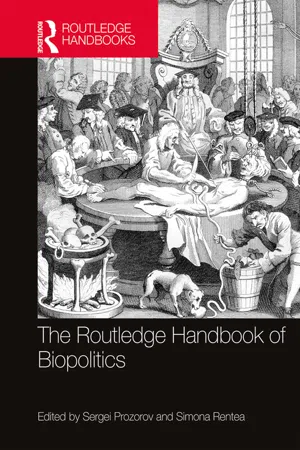
The Routledge Handbook of Biopolitics
- 352 pages
- English
- ePUB (mobile friendly)
- Available on iOS & Android
The Routledge Handbook of Biopolitics
About this book
The problematic of biopolitics has become increasingly important in the social sciences. Inaugurated by Michel Foucault's genealogical research on the governance of sexuality, crime and mental illness in modern Europe, the research on biopolitics has developed into a broader interdisciplinary orientation, addressing the rationalities of power over living beings in diverse spatial and temporal contexts.
The development of the research on biopolitics in recent years has been characterized by two tendencies: the increasingly sophisticated theoretical engagement with the idea of power over and the government of life that both elaborated and challenged the Foucauldian canon (e.g. the work of Giorgio Agamben, Antonio Negri, Roberto Esposito and Paolo Virno) and the detailed and empirically rich investigation of the concrete aspects of the government of life in contemporary societies. Unfortunately, the two tendencies have often developed in isolation from each other, resulting in the presence of at least two debates on biopolitics: the historico-philosophical and the empirical one. This Handbook brings these two debates together, combining theoretical sophistication and empirical rigour.
The volume is divided into five sections. While the first two deal with the history of the concept and contemporary theoretical debates on it, the remaining three comprise the prime sites of contemporary interdisciplinary research on biopolitics: economy, security and technology. Featuring previously unpublished articles by the leading scholars in the field, this wide-ranging and accessible companion will both serve as an introduction to the diverse research on biopolitics for undergraduate students and appeal to more advanced audiences interested in the current state of the art in biopolitics studies.
Frequently asked questions
- Essential is ideal for learners and professionals who enjoy exploring a wide range of subjects. Access the Essential Library with 800,000+ trusted titles and best-sellers across business, personal growth, and the humanities. Includes unlimited reading time and Standard Read Aloud voice.
- Complete: Perfect for advanced learners and researchers needing full, unrestricted access. Unlock 1.4M+ books across hundreds of subjects, including academic and specialized titles. The Complete Plan also includes advanced features like Premium Read Aloud and Research Assistant.
Please note we cannot support devices running on iOS 13 and Android 7 or earlier. Learn more about using the app.
Information
Index
- The Abnormal (Foucault) 30
- abortion 282, 285; in Aristotle’s Politics24; attitudes toward 318–19, 323; caused by chromosomal abnormalities 304; obligatory 286; and prenatal testing 291
- abortion legislation 284
- abortion politics 285, 291
- Abu Ghraib 148
- Achmat, Zackie 244–5
- Act Ensuring the Protection of Embryos in Connection with the Importation and Utilization of Human Embryonic Stem Cells 305
- activism_ in Africa 204; anti-GMO 269, 273; environmental 261–5, 266–7, 268
- Adorno, Theodor W. 62
- adultery legislation 284
- adventurism_ capitalistic 190; military 145
- aesthetic experience 10, 81; and eventualization 85–7; and the ocular function 83–5, 90, 91–2; and the suspension of speech 83–4
- aesthetics: and biopolitics 82, 84–7, 90–2; possible political uses of 88
- affordances 188–91
- Africa: and the African peasant 208; colonial and post-colonial 205; ecological footprints in 212; and the educated model farmer 208–10, 217–18; environmental citizens in 215–18; environmental initiatives in 205; and the green consumer 211–13, 217–18; immigrants and xenophobia in 214–15; invasive species in 214; over-consumption in 210–11; over-population in 207; population growth in 205; sub-Saharan 242; urban masses in 210–11
- African Development Bank 212
- Agamben, Giorgio 1, 9–12, 82, 117, 330; on affirmative biopolitics 137; on the ‘apparatus...
Table of contents
- Cover Page
- Half Title Page
- Title Page
- Copyright Page
- Table of Contents
- Notes on Contributors
- Introduction
- Section I Biopolitics: History of the concept
- Section II Contemporary theoretical controversies
- Section III Biopolitics and economy
- Section IV Biopolitics and security
- Section V Biopolitics and technology
- Conclusion: Whither biopolitics? Current tendencies and directions of future research
- Index